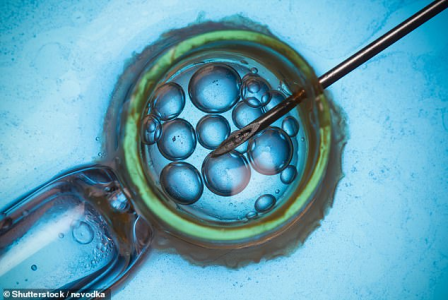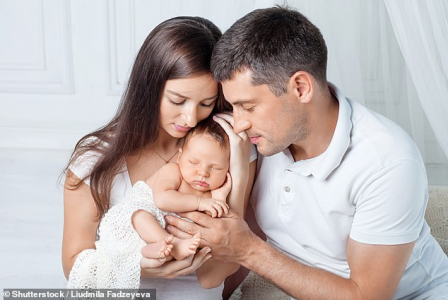Incredible medical breakthrough: First-ever British three-parent baby marks a new era in IVF
In a remarkable and groundbreaking medical development, Britain's first-ever three-parent baby has been born, marking a significant advancement in In-Vitro Fertilisation (IVF) treatment. The Seniors Discount Club is always delighted to share fascinating news, and this truly feels like the dawn of a new era in medical treatment.

The technique, called Mitochondrial Donation Treatment (MDT), serves as a means of protecting children from a variety of mitochondrial disorders, such as muscular dystrophy. These disorders can result in poor growth, muscle weakness, learning disabilities, and even early death. As we age, it's more important than ever to keep informed about developments that can help future generations lead healthier lives.
These illnesses are typically passed down through faults in the mother's mitochondria, which are essentially the tiny 'engine rooms' that power cells. The innovative MDT procedure allows women to swap their diseased mitochondria with healthy mitochondria obtained from a second female's egg.
A Freedom of Information response provided by the United Kingdom's fertility regulator, the Human Fertilisation and Embryology Authority (HFEA), recently revealed that the first 'three-parent babies' were born using this technique. While technically, the babies are born with two mothers, the second 'mother' has no genuine genetic link to the child, contributing only a mere 0.1% of her DNA.

There have been previous concerns among critics that the successful implementation of this technique could lead to the creation of 'designer' babies. However, supporters claim that mitochondrial donation is a lifeline for around 3,000 women who run the risk of passing on potentially life-threatening diseases.
The HFEA has confirmed that a handful of babies have been born in the UK following MDT treatment. Although the exact number hasn't been disclosed, the organisation stated that it's 'less than five' as of April. The families involved remain unidentified, but it's believed that the first three-parent babies may have been born through the collaboration of two mothers who had known each other, with eligible women possibly having asked friends to serve as egg donors.
Sarah Norcross, the director of the Progress Educational Trust (PET), a charity dedicated to supporting people affected by genetic conditions and infertility, stated that it's crucial to proceed with caution in these early stages. The HFEA currently only grants permission for mitochondrial donation on a case-by-case basis, as the technology still requires close monitoring and assessment.
Britain earned the distinction of being the first country in the world to legalise three-parent babies under licence in 2015. The Newcastle Fertility Centre at Life Clinic was then granted approval to perform the procedure by the HFEA in 2017, marking a 'momentous day.'
Although three-parent babies have already been born in countries such as Mexico and Ukraine using slightly different methods, the technique has stirred controversy abroad. In certain instances, it has been employed not only to prevent mitochondrial diseases from being passed down but also to aid infertile women in conceiving using a second woman's DNA.
British experts have maintained that there is currently no evidence to suggest that mitochondrial donation can work for such purposes. The technique, used in Britain solely to prevent mitochondrial disorders, involves removing the nucleus from the mother's egg and placing it in an emptied-out egg donated by another woman.
Peter Thompson, the chief executive of the HFEA, acknowledged these concerns but pointed out that mitochondrial donation treatment offers families with severe inherited mitochondrial illness the possibility of a healthy child.
The UK was the first country in the world to allow mitochondrial donation treatment within a regulatory environment, and the HFEA oversees a robust framework to ensure that mitochondrial donation is provided in a safe and ethical manner. Despite the potential benefits of MDT, it is crucial to carefully weigh the ethical implications and potential risks before any application for treatment is approved. Currently, in the UK, MDT is only allowed on a case-by-case basis, and the HFEA has strict regulations overseeing the use of this procedure to ensure it is used safely and ethically.
As we continually seek to stay informed on advances in medical treatment and technology, this breakthrough demonstrates the tremendous potential of mitochondrial donation. The HFEA remains committed to reviewing clinical and scientific developments in the field, with the hope that this innovative procedure paves the way for healthier lives for future generations.
 What are your thoughts on the ethical implications of using mitochondrial donation treatment to create three-parent babies? We want to hear from you, members of the SDC community! Share your opinions in the comments below, and let's start a meaningful discussion about this important issue. At the SDC, we value your voice and welcome your input on topics that matter. So, don't hesitate—join the conversation today!
What are your thoughts on the ethical implications of using mitochondrial donation treatment to create three-parent babies? We want to hear from you, members of the SDC community! Share your opinions in the comments below, and let's start a meaningful discussion about this important issue. At the SDC, we value your voice and welcome your input on topics that matter. So, don't hesitate—join the conversation today!

A revolutionary IVF procedure has resulted in the birth of Britain's first baby with DNA from three parents. Source: dailymail.co.uk
The technique, called Mitochondrial Donation Treatment (MDT), serves as a means of protecting children from a variety of mitochondrial disorders, such as muscular dystrophy. These disorders can result in poor growth, muscle weakness, learning disabilities, and even early death. As we age, it's more important than ever to keep informed about developments that can help future generations lead healthier lives.
These illnesses are typically passed down through faults in the mother's mitochondria, which are essentially the tiny 'engine rooms' that power cells. The innovative MDT procedure allows women to swap their diseased mitochondria with healthy mitochondria obtained from a second female's egg.
A Freedom of Information response provided by the United Kingdom's fertility regulator, the Human Fertilisation and Embryology Authority (HFEA), recently revealed that the first 'three-parent babies' were born using this technique. While technically, the babies are born with two mothers, the second 'mother' has no genuine genetic link to the child, contributing only a mere 0.1% of her DNA.

Each baby will have two mothers, but the second 'mother' will not have any real genetic connection to the child. Source: dailymail.co.uk
There have been previous concerns among critics that the successful implementation of this technique could lead to the creation of 'designer' babies. However, supporters claim that mitochondrial donation is a lifeline for around 3,000 women who run the risk of passing on potentially life-threatening diseases.
The HFEA has confirmed that a handful of babies have been born in the UK following MDT treatment. Although the exact number hasn't been disclosed, the organisation stated that it's 'less than five' as of April. The families involved remain unidentified, but it's believed that the first three-parent babies may have been born through the collaboration of two mothers who had known each other, with eligible women possibly having asked friends to serve as egg donors.
Sarah Norcross, the director of the Progress Educational Trust (PET), a charity dedicated to supporting people affected by genetic conditions and infertility, stated that it's crucial to proceed with caution in these early stages. The HFEA currently only grants permission for mitochondrial donation on a case-by-case basis, as the technology still requires close monitoring and assessment.
Britain earned the distinction of being the first country in the world to legalise three-parent babies under licence in 2015. The Newcastle Fertility Centre at Life Clinic was then granted approval to perform the procedure by the HFEA in 2017, marking a 'momentous day.'
Although three-parent babies have already been born in countries such as Mexico and Ukraine using slightly different methods, the technique has stirred controversy abroad. In certain instances, it has been employed not only to prevent mitochondrial diseases from being passed down but also to aid infertile women in conceiving using a second woman's DNA.
British experts have maintained that there is currently no evidence to suggest that mitochondrial donation can work for such purposes. The technique, used in Britain solely to prevent mitochondrial disorders, involves removing the nucleus from the mother's egg and placing it in an emptied-out egg donated by another woman.
Ethical Concerns Surrounding Three-Parent Babies and Designer Babies
The introduction of mitochondrial donation treatment (MDT) has sparked a heated debate around the ethical implications of using this procedure to create three-parent babies. While some experts hail the potential benefits of MDT, others are concerned about the risks involved. Disrupting the activity of genes transferred between eggs could lead to a child with an increased risk of developing health problems later in life, such as cancer or diabetes. These concerns have also led to fears that the successful use of MDT could lead to 'designer' babies, where parents choose genetic characteristics for their children.Peter Thompson, the chief executive of the HFEA, acknowledged these concerns but pointed out that mitochondrial donation treatment offers families with severe inherited mitochondrial illness the possibility of a healthy child.
The UK was the first country in the world to allow mitochondrial donation treatment within a regulatory environment, and the HFEA oversees a robust framework to ensure that mitochondrial donation is provided in a safe and ethical manner. Despite the potential benefits of MDT, it is crucial to carefully weigh the ethical implications and potential risks before any application for treatment is approved. Currently, in the UK, MDT is only allowed on a case-by-case basis, and the HFEA has strict regulations overseeing the use of this procedure to ensure it is used safely and ethically.
As we continually seek to stay informed on advances in medical treatment and technology, this breakthrough demonstrates the tremendous potential of mitochondrial donation. The HFEA remains committed to reviewing clinical and scientific developments in the field, with the hope that this innovative procedure paves the way for healthier lives for future generations.
Key Takeaways
- Britain's first three-parent baby has been born using a groundbreaking IVF procedure called mitochondrial donation treatment (MDT).
- The MDT procedure swaps diseased mitochondria with healthy ones from another woman's egg and protects children from a group of mitochondrial disorders.
- The technique has been used in the UK to prevent mitochondrial diseases and has sparked debate over potential 'designer' babies.
- The Human Fertilisation and Embryology Authority (HFEA) confirms that a small number of babies have been born in the UK after MDT.







